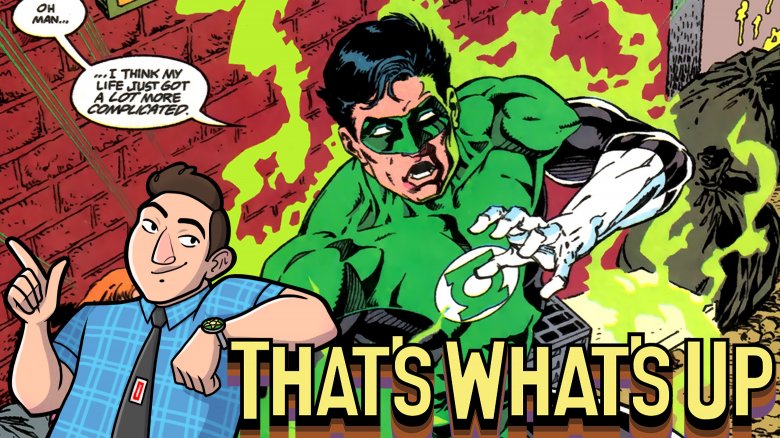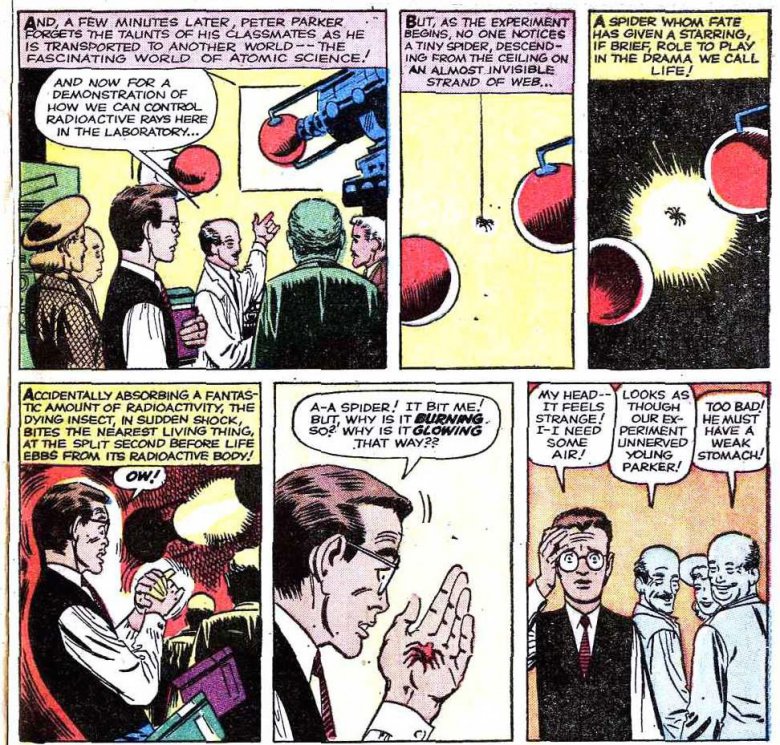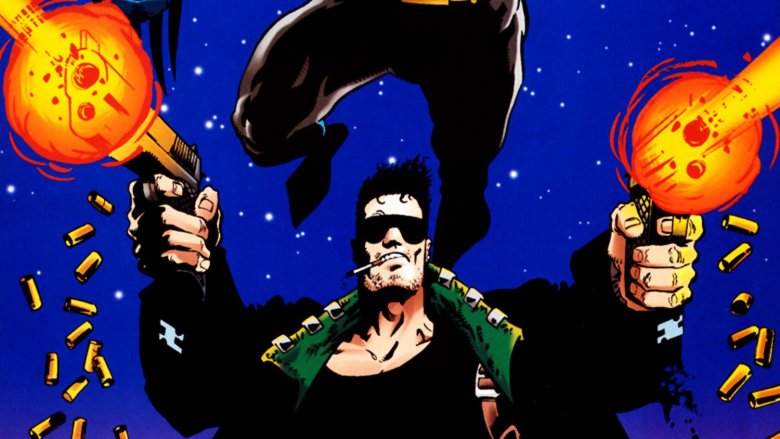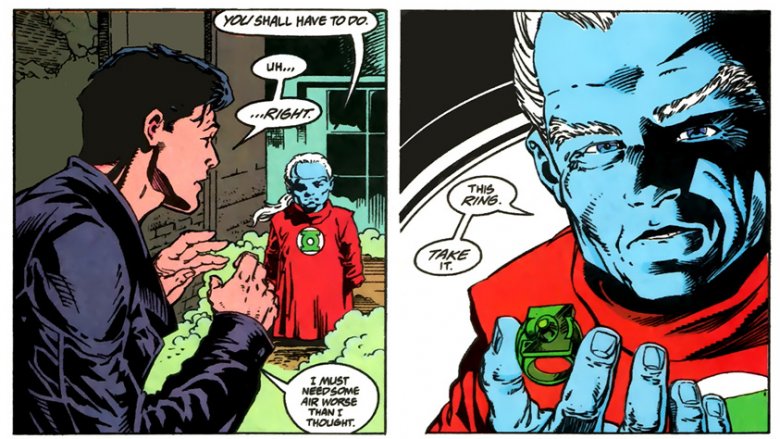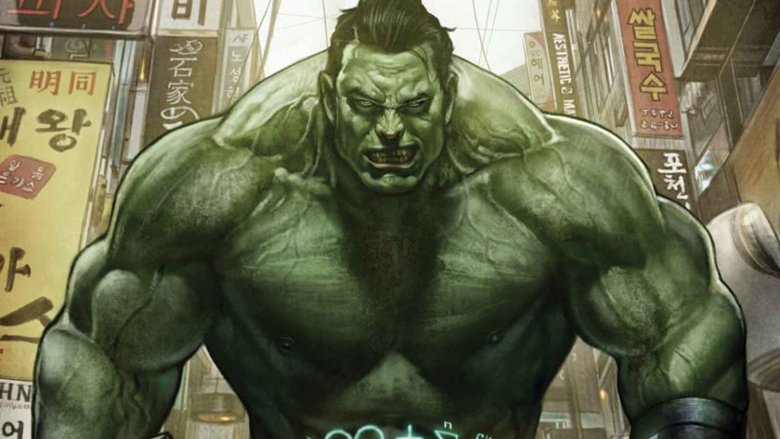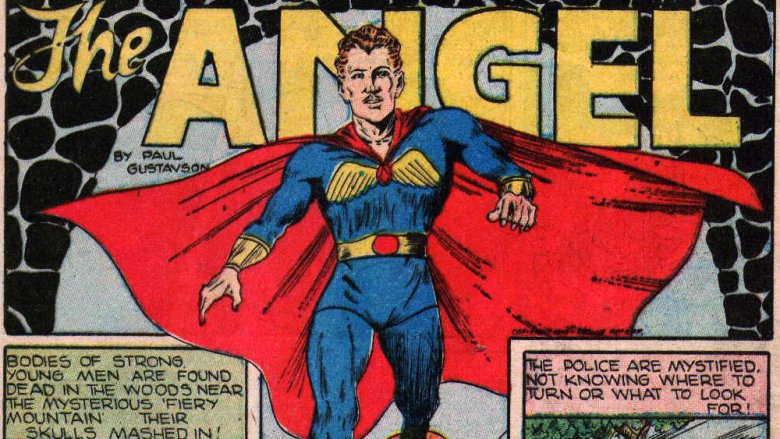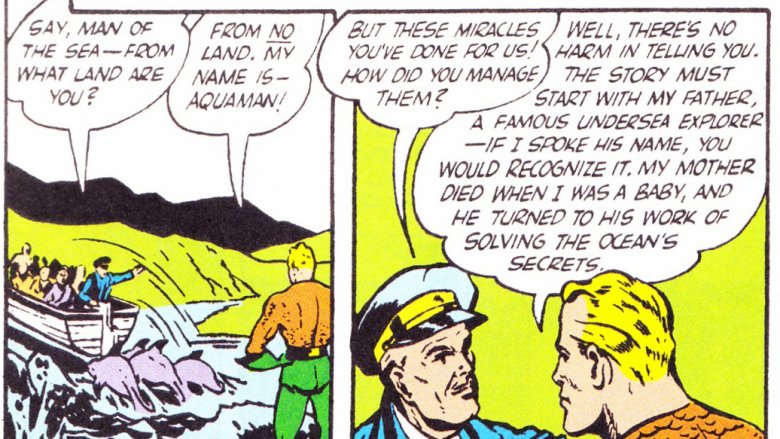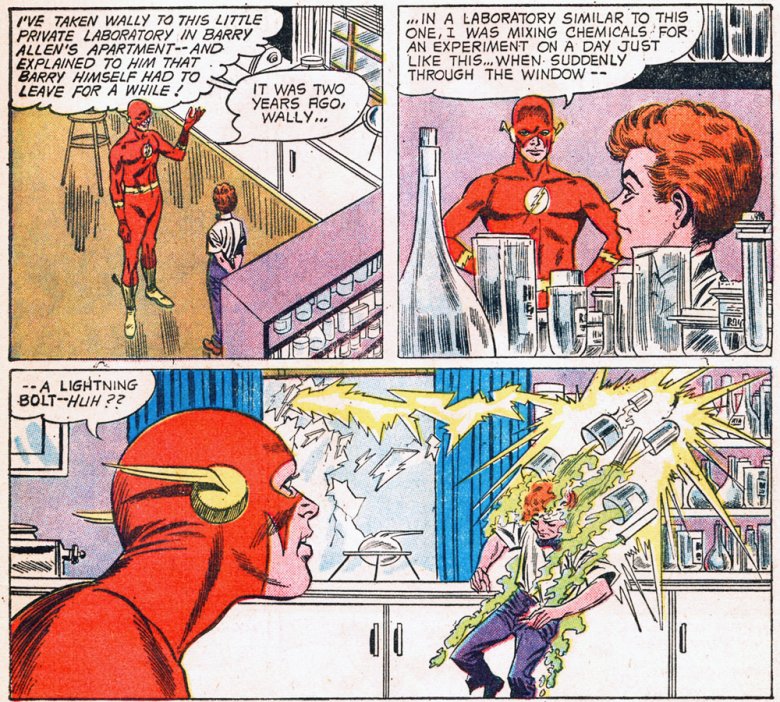That's What's Up: The Best Superheroes With The Worst Origin Stories
Each week, comic book writer Chris Sims answers the burning questions you have about the world of comics and pop culture: what's up with that? If you'd like to ask Chris a question, please send it to @theisb on Twitter with the hashtag #WhatsUpChris, or email it to staff@looper.com with the subject line "That's What's Up."
Q: What great comics characters have the worst origin story? — @BenCollinsJokes
Origin stories can be a tricky thing. If you manage to come up with a good one, you've got something that can immediately hook a reader, and provide the foundation for everything a character does: the sole survivor of a dead planet whose incredible power can save everyone on his adopted home, a child who sees his parents murdered in front of him and vows to never let that tragedy befall anyone else, or a scrawny youngster who wants so badly to stand against the threat of the Nazis that he undergoes an experimental treatment with no idea what it'll do to his body. Those are great origin stories. The only problem is that they've all been done, sometimes two or three times each.
With as many superheroes as there have been over the past 80 years, plenty of origin stories have gone in some pretty weird directions, and it works out well about as often as it doesn't. The good news, though, is that having a goofy, weird, or just plain bad origin story never stopped anyone from becoming a truly great superhero.
Spider-Man
Look, let's be honest with each other here. Spider-Man is great — in my opinion as someone who's done a decent amount of work for Marvel Comics, he's the single greatest superhero of all time, to the point where virtually every character created after him was informed by his approach to superheroics in one way or another. But that origin... yikes.
I don't mean the part with Uncle Ben getting murdered and the thing about responsible power that you've probably heard about four thousand times in your life, because that's actually the kind of thing that's worth hearing that often. I don't even mean the part about how Peter Parker gets his powers and then immediately tries to make money in the world of professional wrestling, because that actually rules, and has even led to some pretty amazing comics about how Crusher Hogan was just trying to keep his indie promotion going while Vince Jr. was shutting down the territories. The part I'd take issue with, the part that you just have to sort of accept and move on with if you're going to like superheroes at all, is when he gets those powers by being bitten by a radioactive spider.
It's been around at the core of a great character for so long that I think we're probably all used to it, and to be fair, it's not really a plot point that's unique to Spidey. In the early '60s, when the possibilities of the Atomic Age were at the apex of their pop-cultural relevance, it seemed like everybody was getting a heaping handful of rads dropped into their situation. The Fantastic Four got their powers from cosmic rays, the Hulk got an overdose of gamma radiation, and it's honestly surprising that Thor's hammer was made of Uru and not uranium. Spider-Man, though, has always been the one that sticks out.
Maybe it's just because there's that weird intermediary of the spider becoming radioactive and then passing that on to Peter, but it's so weird that "bitten by a radioactive _____" has become shorthand for the strangeness of comic book origin stories. There have even been attempts to retcon it away, including one pretty notable story where it was explained that the spider was a mystical animal totem spirit that just happened to be radioactive, which is arguably the only way to make it even goofier than it already was. That said, it's also pretty baseline for the superhero genre's nebulous understanding of both radioactivity and spider-bites. If you can deal with that, then 90 percent of the oddball tropes that come along with the genre are going to be just fine.
Hitman
Speaking of bug bites and radiation, we have Tommy Monaghan. As Hitman, he was arguably the single best new character that DC had in the '90s, and the only reason that's even "arguable" is that he's up against folks like Jack Knight, Harley Quinn, Impulse, and the Superboy who wore a leather jacket. The '90s were a golden age, folks, and never let anyone who's grumpy about belt pouches tell you differently.
Anyway, while Tommy's adventures as a hired killer with a conscience made for some of the best stories of the decade — standing right up there with Preacher as some of Garth Ennis's best writing work, with amazingly expressive art for all 60 issues by John McCrea — that origin story is... well. Remember what I said about how the '90s ruled? The flip side to that is stuff like Bloodlines.
On paper, it was a pretty good idea. Each DC title would introduce a brand new character who could potentially be the company's next breakout star, with an accompanying world-threatening event designed to provide a reason for the sudden increase in superhumans. They'd actually had a bit of success with that before in the '80s with Invasion!, one of the best DC crossovers ever, which involved aliens dropping a "Gene Bomb" that would activate the "metagene" and trigger humans' latent super-powers. Why exactly they thought creating a bunch of new heroes would make Earth easier to conquer still remains to be seen, but it did its job and gave the DCU a functional equivalent to Marvel's mutants: an excuse to create new characters without having to dig too hard to find an origin story. Bloodlines was similar, but with the '90s grossout X-Files twist of having aliens abduct individual humans, experiment on them, and drop them back on Earth with unexpected powers.
Most of the characters were quickly forgotten about, like Shadowstryke or Nightblade — or are much better left forgotten, like Jamm — but Tommy Monaghan managed to succeed well beyond the mess of his origins. Part of that is because Ennis and McCrea are both in contention for G.O.A.T. status, but another part is because his origin was very rarely referenced. The powers he got in Bloodlines were X-ray vision and telepathy, but both powers gave him migraines to use and left him with completely blacked-out eyes, so the biggest nod to Bloodlines was that he always wore sunglasses. Other than that, he was just a slightly super-powered hitman trying to make his living in Gotham City, which is about as difficult as you might expect.
Kyle Rayner
Now that I think of it, the '90s were loaded up with some pretty dodgy origin stories. Take Kyle Rayner, for instance, who took the role of Green Lantern in 1994. He was the perfect character for the era, an inexperienced hero trying to shoulder a massive legacy, with a civilian life and a personality cut directly from the cloth of Spider-Man's influence. He was a member of the "Big Seven" Justice League, when the team was at its most cosmically powerful, but he was the rookie — the guy who had the most dangerous weapon in the universe on his finger and who was terrified of using it wrong. He was so perfect for the mid-'90s that he was literally modeled after Keanu Reeves.
But he was also the latest in a legacy of heroes that stretched all the way back to 1940, and it's pretty easy to see why some readers thought his origin story didn't measure up. The Silver Age Green Lantern had introduced a new sci-fi theme and the idea of the Green Lantern Corps, a roster of space-cops where each member was chosen for being totally honest and totally fearless. When Kyle showed up, however, the Corps had been destroyed and he was given the last Green Lantern ring by a desperate Guardian of the Universe, whose evaluation of Kyle's character was, and I quote, "you shall have to do."
If that wasn't bad enough, he had the misfortune of replacing Hal Jordan, who, while not popular enough to warrant keeping around, was certainly beloved by a generation of Green Lantern fans. In order to pave the way for Kyle, Hal was driven insane by the destruction of his hometown (and his supporting cast), and then spent the next few issues murdering the rest of the Green Lantern Corps before christening himself Parallax, a supervillain who tried to destroy the entirety of the space-time continuum. It's the least heroic end that a superhero could possibly have, and longtime Hal Jordan fans were left understandably enraged — and plenty of them never warmed to Kyle during his ten years of service.
Amadeus Cho
As you can tell from the past few examples, superhero origins in the modern age tend to get a lot more complex than "doomed planet, desperate scientists, kindly couple, last hope," and it's not usually a good thing. Amadeus Cho, for example, is easily one of the best new Marvel characters created after 2000, and a personal favorite of mine. His origin, though... I wouldn't call it bad, per se, but it sure is complicated.
See if you can follow along: Amadeus Cho was originally conceived by Greg Pak and Takeshi Miyazawa as a 21st-century update of a Golden Age character called Master Mind Excello, who's so obscure that he appeared exactly twice in 1940, and was never seen again. In Cho's origin story, "Master Mind" was a title he won in an online game show for teenage geniuses sponsored by the Excello Soap Company. Considering that he can see math and is one of the ten smartest people on the planet — a version of the planet that includes Reed Richards, Tony Stark, and a dude whose brain is roughly the size of a Christmas goose — he does pretty well. So well, in fact, that he's targeted by the contest's real sponsor, Pythagoras Dupree, who wants to eliminate what he sees as rival geniuses. Dupree blows up Cho's house and parents, and Amadeus is only saved when he's warned by an FBI agent.
Except that the FBI agent is actually Athena — the actual Greek goddess — in disguise, and she's grooming him to become her protégé. That turned out to be pretty handy since he was, at the time, the sidekick of Hercules, and would in fact replace Hercules as the Olympian Pantheon's "Prince of Power" after Hercules died (but not really) in order to prevent the Greek gods from overwriting reality with an artificial universe they created in a pocket dimension.
Oh, and then he became the Hulk.
Like I said, I love that character to pieces, and in the context of ten years' worth of stories, all that stuff makes perfect sense. As the origin story for the current Hulk, it's a bit much, but then again, that's pretty much how comics work. Seriously, remind me to tell you about Rick Jones sometime.
The Golden Age Angel
On the other hand, sometimes a little complexity can be a good thing. The way story weaves its way through the Marvel Universe is just a necessary function of actually having a universe to weave through. In the Golden Age, though, the idea of a shared universe still just a vague notion and everyone was trying to be the next Superman. A lot of the origin stories you got there were pretty straightforward, even if they got pretty wild. In fact, the most complicated Golden Age origin story that I can think of comes from the Vagabond, an FBI agent who dressed as a hobo clown and fought crime while insisting his name was Chauncey Throttlebottom III.
The Angel, who made his debut in Marvel Comics #1 alongside the Sub-Mariner and the Human Torch, was pretty simple even by those standards. His origin is that when he was a kid, he had tutors who taught him everything. No, seriously: that's the entire origin. He knows everything, but he learned it all the usual way, from a bunch of teachers. Also he hung out in a prison because his dad was the warden, and the convicts liked him so they also taught him all of their underworld secrets.
This dude was the fourth most popular character in Marvel's roster for the entirety of the '40s, which should give you an idea of why the folks who had Superman, Batman, and Wonder Woman weren't really worried about the competition.
The Golden Age Aquaman
There are, however, characters whose origins somehow managed to get less complicated as time went on. Just look at Aquaman — the modern idea is pretty simple, he's the King of Atlantis who comes up to the surface world to punch out bank robbers, and he occasionally hangs out with his best friend, an octopus. As far as comics go, that's about as straightforward as you could ask for.
The original idea, though, is so bad that it's kind of shocking that this character managed to keep existing for the next 78 years — and that's even when you adjust for the fact that this is Aquaman we're talking about here. In his first appearance, he insists that you'd definitely know who his dad is if he said his name, which he won't, which is sort of like the Atlantean equivalent of insisting that you really do have a girlfriend who lives in Canada and everyone else wouldn't know her because she goes to a different school. With that out of the way, he then goes on to spin a tale of child endangerment that is downright harrowing.
It seems that after Aquaman's mom died, Aquaman's dad (you'd know him if I said his name) decided to deal with his grief by taking to the sea, with his tiny baby son in tow. After discovering Atlantis, he moved in, built himself a waterproof house at the bottom of the ocean, and then raised his son using lost technology so he could survive underwater, literally naming him "Aquaman." Needless to say, this raises a lot of questions about how Aquaman's dad got food, drinkable water, and, you know, air, and also why Aquaman will not speak his father's name. None of this is ever addressed until 1956, when they just threw it all out and gave him an octopus sidekick.
Literally every version of the Flash
Finally, it's important to note that that sometimes, bad origin stories for great characters transcend eras. They can even be handed down from characters to their successors, like the Flash.
Again, they're great characters. More than any others, even Superman and Batman, they embody the concept of the DC Universe and the legacy that it's built upon, and they star in some of the company's most memorable stories. From day one, though, those origins are some rough stuff. Jay Garrick, the Golden Age Flash, famously got his super-speed powers by inhaling fumes given off by "hard water," which is basically just water with a little too much calcium in it. Boil that stuff enough to give off fumes, and I'm sorry to report that it won't give you super-speed. It'll just give you bad tea.
Barry Allen, believe it or not, has it worse. Being splashed with chemicals that were struck by lightning? That part's honestly fine; before radiation took over, "chemicals" were the concept most likely to result in super-powers. The part where the same thing happens a second time while Barry's explaining how he got his powers, resulting in Kid Flash's origin? That stretches credulity just a little bit. When it's revealed that this was actually all the doing of a weird little "heavenly helpmate" named Mopee who appeared in exactly one story, though? That winds up being such an atrociously bad idea that it was never mentioned again.
But hey, it could be worse. Johnny Quick, another character blessed with the ability to run really fast, got his powers when he realized that he could achieve super-speed just by thinking really hard about math. Maybe that radioactive spider wasn't as goofy as i thought.
Each week, comic book writer Chris Sims answers the burning questions you have about the world of comics and pop culture: what's up with that? If you'd like to ask Chris a question, please send it to @theisb on Twitter with the hashtag #WhatsUpChris, or email it to staff@looper.com with the subject line "That's What's Up."
